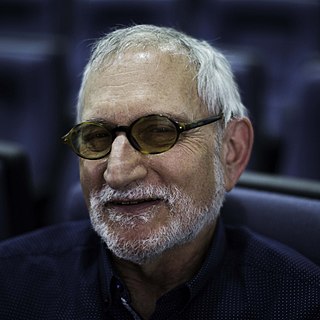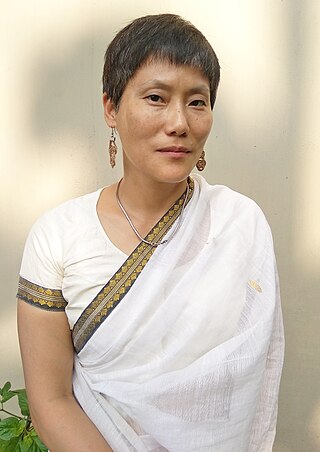
Laura Nader is an American anthropologist. She has been a Professor of Anthropology at the University of California, Berkeley since 1960. She was the first woman to receive a tenure-track position in the department. She is also the older sister of U.S. activist, consumer advocate, and frequent third-party candidate Ralph Nader, and the younger sister of community advocate Shafeek Nader and social scientist Claire Nader.
Richard Borshay Lee is a Canadian anthropologist. Lee has studied at the University of Toronto and University of California, Berkeley, where he received a Ph.D. He holds a position at the University of Toronto as Professor Emeritus of Anthropology. Lee researches issues concerning the indigenous people of Botswana and Namibia, particularly their ecology and history.
Oyotunji African Village is a village located near Sheldon, Beaufort County, South Carolina that was founded by Oba Efuntola Oseijeman Adelabu Adefunmi I in 1970.
João Guilherme Biehl is a Brazilian medical anthropologist known for his innovative studies of global health, poverty, and suffering. He is currently the Susan Dod Brown Professor of Anthropology, Chair of the Department of Anthropology, and Director of the Brazil LAB at Princeton University.
Nancy Oestreich Lurie was an American anthropologist who specialized in the study of North American Indian history and culture. Lurie's research specialties were ethnohistory, action anthropology and museology; her areal focus was on North American Indians, especially the Ho-Chunk and the Dogrib (Tlicho) of the Canadian NWT; and the comparative study of territorial minorities.
Adeline Marie Masquelier is a Professor of Anthropology at Tulane University in New Orleans, Louisiana.

The National Anthropological Archives is the third largest archive in the Smithsonian Institution and a sister archive to the Human Studies Film Archive. The collection documents the history of anthropology and the world's peoples and cultures, and is used in indigenous language revitalization. It is located in the Smithsonian's Museum Support Center in Suitland, Maryland, and is part of the Department of Anthropology at the National Museum of Natural History.
Kay Barbara Warren is an American academic anthropologist, known for her extensive research and publications in cultural anthropology studies. Initially trained as an anthropologist specializing in field studies of Latin American and Mesoamerican indigenous cultures, Warren has also written and lectured on an array of broader anthropological topics. These include studies about the impacts on politically marginalized and indigenous communities of social movements, wars and political violence, transnationalism, and foreign aid programs. As of 2009 Warren holds an endowed chair as the Charles C. Tillinghast Jr. ’32 Professor in International Studies at Brown University,. Before joining the faculty at Brown in 2003, Warren held professorships at both Harvard and Princeton universities.
Jason Baird Jackson is an American anthropologist who is Professor of Folklore and Anthropology at Indiana University Bloomington. He is "an advocate of open access issues and works for scholarly communications and scholarly publishing projects." At IUB, he has served as Chair of the Department of Folklore and Ethnomusicology and as Director of the Folklore Institute. According to the Journal of American Folklore, "Jason Baird Jackson establishes himself as one of the foremost scholars in American Indian studies today."
Jeffrey E. Cole is an American anthropologist. He is professor of Anthropology, chairman of the Department of Anthropology and dean at Connecticut College, and served as president of the Society for the Anthropology of Europe of the American Anthropological Association from 2012 to 2014. Cole is an expert on race and ethnicity in Europe, a subject on which he has written and edited numerous books and articles.

Paul Stoller is an American cultural anthropologist. He is a professor of anthropology at West Chester University in West Chester, Pennsylvania.
Catherine Lowe Besteman is an Italian American abolitionist educator at Colby College, where she holds the Francis F. Bartlett and Ruth K. Bartlett Chair in Anthropology. Her research and practice engage the public humanities to explore abolitionist possibilities in Maine. She has taught at that institution since 1994.
Leslie Crum Aiello is an American paleoanthropologist and professor emeritus of University College London. She was the president of Axel Lennart Wenner-Gren donated Wenner-Gren Foundation for Anthropological Research from 2005 to 2017. In 2014, Aiello was elected to the American Philosophical Society. She is currently president of the American Association of Physical Anthropologists.
Takie Sugiyama Lebra was a Japanese anthropologist and professor. Her “contributions to the anthropology of Japan are regarded as foundational”.
Sarah E. Wagner is an American professor of anthropology at the George Washington University's Columbian College of Arts and Sciences and a 2017 Guggenheim Fellow. Wagner is especially recognized for her research and work on genocides.

Dolly Kikon is an Indian anthropologist and author from Nagaland. She is a Professor at the Department of Anthropology, University of California, Santa Cruz. She was previously Associate Professor of Anthropology at the University of Melbourne and a senior research advisor at the Australia India Institute, engaging in research and policy initiatives between India and Australia. She serves on the Council of Advisors for The India Forum.
Rebecca Gowland is a bioarchaeologist. She is a Professor of Archaeology at Durham University.
Akinwumi Ogundiran is the Cardiss Collins Professor of Arts and Sciences and Professor of History at Northwestern University. He is an archaeologist, anthropologist, and cultural historian, whose research focuses on the Yoruba world of western Africa, Atlantic Africa, and the African Diaspora. He was born in Ibadan, Nigeria, and migrated to the United States in 1993. He was Chancellor's Professor and Professor of Africana Studies, Anthropology & History at UNC Charlotte.
Laurence Ralph is an American writer, filmmaker and researcher. He is a professor of anthropology at Princeton University and the Director of Center on Transnational Policing.



